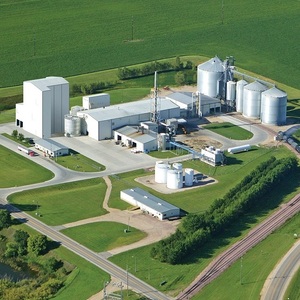Gevo discusses plans for low-carbon ethanol, RNG

PHOTO: Gevo Inc.
November 13, 2019
BY Erin Krueger
Gevo Inc. released third quarter financial results on Nov. 12, highlighting plans to sell low-carbon ethanol into the California marketplace, develop a 1 MMgy hydrocarbon plant and implement renewable natural gas (RNG) and wind energy at its existing biorefinery in Luverne, Minnesota.
Patrick Gruber, CEO of Gevo, opened the company’s third quarter earnings call by discussing progress made by the company and announcing Gevo believes it can “become profitable, or close to it” by the end of 2021 if the company is successful in improving the carbon footprint of its Luverne plant and selling low-carbon ethanol into California’s Low Carbon Fuel Standard market. The company plans to use wind energy and RNG to offset electricity and natural gas use at the Luverne plant, thereby lowering the carbon intensity (CI) score of the ethanol produced.
The RNG projects are expected to come online and be qualified for the California LCFS in late 2020 or early 2021, Gruber said. “We’ve signed definitive agreements with one dairy and we will soon close with a couple of others,” he continued, noting the agreements will allow for the development of manure-based anaerobic digestion systems at those dairies.
Advertisement
In September, Gevo announced it had secured the supply of 5 MW of wind form an affiliate of Juhl Energy to power the Luverne plant. This new source of wind-powered electriicty is expected to commence during the first quarter of 2020.
Gruber stressed that while Gevo’s strategic intent is not to simply be a long-term supplier of low-carbon ethanol, he said company sees low-carbon ethanol as a means to generate cash in the near-term while it builds out its Luverne expansion.
Regarding plans for a 1 MMgy hydrocarbon plant adjacent to the existing Luverne plant, Gruber said the plant would take approximately 12 months to develop after financing is completed. He said the company currently expects the facility to come online in early 2021. Longer-term, Gruber noted the company plans to develop a larger hydrocarbon facility with 8 MMgy to 10 MMgy of capacity.
Advertisement
Gevo reported third quarter revenues of $6.1 million, down from $8.6 million during the same period of last year. Revenue derived at the Luverne plant for ethanol sales and related products was $5.6 million, down $2.5million from last year. Hydrocarbon revenue was $600,000 for the quarter, up from $500,000 during the third quarter of 2018.
Gross loss was $3.8 million for the quarter, compared to $2.1 million during the same period of last year. Gevo reported a non-GAAP cash EBITDA loss of $5.58 million for the third quarter, compared to a $12.4 million loss for the same period of 2018. Gevo incurred a net loss of $8.6 million, compared to a net loss of $6.9 million for the third quarter of last year. Non-GAAP adjusted net loss was $8.6 million, compared to a loss of $6.9 million during the third quarter of 2018.
Related Stories
The U.S. Energy Information Administration maintained its forecast for 2025 and 2026 biodiesel, renewable diesel and sustainable aviation fuel (SAF) production in its latest Short-Term Energy Outlook, released July 8.
XCF Global Inc. on July 10 shared its strategic plan to invest close to $1 billion in developing a network of SAF production facilities, expanding its U.S. footprint, and advancing its international growth strategy.
U.S. fuel ethanol capacity fell slightly in April, while biodiesel and renewable diesel capacity held steady, according to data released by the U.S. EIA on June 30. Feedstock consumption was down when compared to the previous month.
XCF Global Inc. on July 8 provided a production update on its flagship New Rise Reno facility, underscoring that the plant has successfully produced SAF, renewable diesel, and renewable naphtha during its initial ramp-up.
The U.S. exported 31,160.5 metric tons of biodiesel and biodiesel blends of B30 and greater in May, according to data released by the USDA Foreign Agricultural Service on July 3. Biodiesel imports were 2,226.2 metric tons for the month.
Upcoming Events










